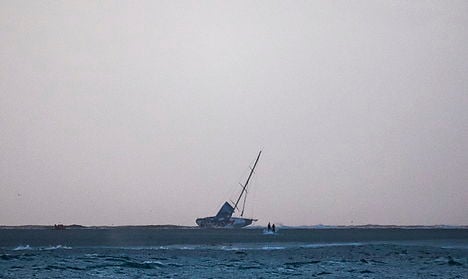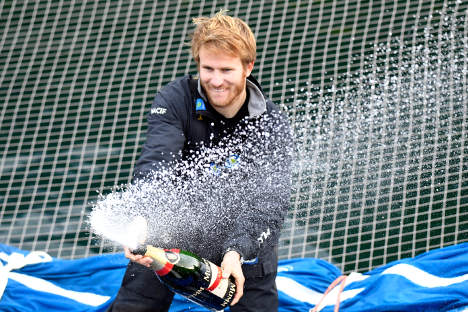YACHTING
Danish crew’s boat crash leads to call for overhaul
After the Danish team in the Volvo Ocean Race had to leave their boat stranded on a reef in the middle of the Indian Ocean, a panel has recommended changing the industry standards of charting.
Published: 11 March 2015 11:18 CET

A Volvo Ocean Race Hand Out image shows Danish Team Vestas Wind aground on the reef in Cargados Carajos Shoals off the coast of Mauritius on November 30th. Photo: Amory Ross/Team Alvimedica/Scanpix
An independent report into the crash of Volvo Ocean Race boat, Vestas Wind, on an Indian Ocean reef has recommended an overhaul of navigational charting in offshore racing to prevent a similar incident in the future.
The Danish boat's crew miraculously avoided serious injury when they collided with the reef at St Brandon on November 29 last year at around 40kph and span 180 degrees before coming to a halt, grounded.
The vessel was badly damaged and the crew were forced to abandon it in the pitch darkness and wade to the safety of a nearby large rock in shark-infested waters before being rescued at first light by coastguards.
The Team Vestas Wind boat has since been retrieved and is being rebuilt for a return to the nine-month marathon race in June, but organizers commissioned a report in December into how the accident occurred and guidelines to avoid a repetition.
A retired Australian Navy rear admiral, Chris Oxenbould, headed the report's panel of three, which revealed its findings on Tuesday in a global media call.
It found that a failure by the crew to spot the reef on onboard electronic navigational guides was to blame and has recommended that industry standards of charting, both electronic and paper, be improved.
In particular, the panel says that a passenger aircraft-style list of check-points should first be ticked off before ocean racing boats take to the open sea.
This currently does not happen in many leading events, including the Volvo Ocean Race, which is widely considered the sport's top offshore challenge.
Both the Volvo Ocean Race and the Vestas Wind's Australian skipper, Chris Nicholson, have welcomed the report.
The fleet sets out from Auckland for the fifth leg of nine on Sunday, March 15. It is the longest and most challenging stage of the nine-month race, which takes the fleet through the Southern Ocean to the next destination of Itajaí in Brazil.
The 38,739-nautical mile race will conclude on June 27, in Gothenburg, Sweden, after visiting 11 ports in total and every continent.
Url copied to clipboard!


 Please whitelist us to continue reading.
Please whitelist us to continue reading.
Member comments